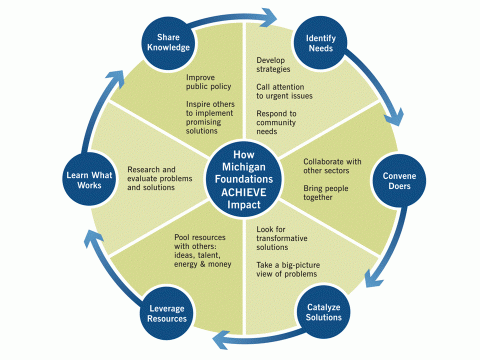Funders by Other Names
March 28, 2012 Leave a comment Earlier this year I co-facilitated a learning session on collaborative social change process design and stakeholder engagement approaches for a group of foundation employees from around the country. As we got deeper into the conversation, some of the participants began to speak to their own doubts about the effectiveness of grantmaking, especially when it only focuses on grantmaking. “In the larger scope of things,” said one program officer, “our money is just a drop in the bucket.” “Frankly,” said another, “there are other ways we can add value, but we limit our own validation of these efforts by calling ourselves ‘grantmakers.'” Interesting. As we explored other avenues for change agency, it was as if we were tapping into the work going on here in Michigan through the Council of Michigan Foundations.
Earlier this year I co-facilitated a learning session on collaborative social change process design and stakeholder engagement approaches for a group of foundation employees from around the country. As we got deeper into the conversation, some of the participants began to speak to their own doubts about the effectiveness of grantmaking, especially when it only focuses on grantmaking. “In the larger scope of things,” said one program officer, “our money is just a drop in the bucket.” “Frankly,” said another, “there are other ways we can add value, but we limit our own validation of these efforts by calling ourselves ‘grantmakers.'” Interesting. As we explored other avenues for change agency, it was as if we were tapping into the work going on here in Michigan through the Council of Michigan Foundations.
This week, my colleague Cynthia and I are working with CMF, its members, and representatives from nonprofit, private business, and public sectors, in exploring how philanthropy can work in partnership with communities to create more, and more equitable, opportunities in a state that is reeling from the economic downturn and this country’s legacy of systemic inequality. Part of the proceedings has included conversation about systemic and structural strategies to addressing the issues, which includes the invitation for grantmakers to consider multiple roles they might play in helping shift the dominant “rich get richer, poor get poorer” narrative in this country. As highlighted in the “3D Wheel” above, these roles include, but are not limited to:
- Convenor
- Catalyst
- Researcher
- Listener
- Advocate
- Communicator
- Curator
- Connector
During the proceedings we also tried to emphasize that stepping into any of these roles effectively entails careful examination of our perhaps unwitting contribution to the very issues we are trying to address. What I’ve already heard is how helpful this list is in that it helps navigate what might otherwise be an ontological and strategic dilemma for grantmakers struggling with the nature of their contribution in a shifting world. And we find that adopting a network mindset may help all of us to reveal other key functions/roles/contributions that may be called upon in making the changes we need. More on that tomorrow . . .
No Comments
Cool! Were you with anyone from W. K. Kellogg? I just arrived in Battle Creek to do a training there in the morning. 🙂
Yes, indeed. Kellogg well represented, including their people working on diversity, equity, and inclusion. Enjoy your time, Jen!